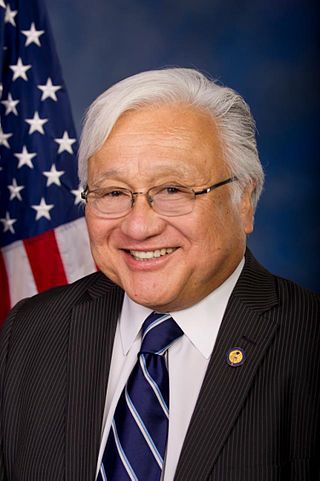
Ronald Lee Wyden is an American politician serving as the senior United States senator from Oregon, a seat he has held since 1996. A member of the Democratic Party, he served in the United States House of Representatives from 1981 until 1996. He is the dean of Oregon's congressional delegation and chairs the Senate Finance Committee.

Michael Makoto Honda is an American politician and former educator. A member of the Democratic Party, he served in Congress from 2001 to 2017.

The Children's Health Insurance Program (CHIP) – formerly known as the State Children's Health Insurance Program (SCHIP) – is a program administered by the United States Department of Health and Human Services that provides matching funds to states for health insurance to families with children. The program was designed to cover uninsured children in families with incomes that are modest but too high to qualify for Medicaid. The program was passed into law as part of the Balanced Budget Act of 1997, and the statutory authority for CHIP is under title XXI of the Social Security Act.
The 1998 Internet Tax Freedom Act is a United States law authored by Representative Christopher Cox and Senator Ron Wyden that established national policy regarding federal and state taxation of the internet, based upon its unique characteristics as a mode of interstate and global commerce uniquely susceptible to multiple and discriminatory taxation. The law prohibits state and local governments from imposing taxes directly on the internet or online activity, such as email taxes, internet access taxes, bit taxes, and bandwidth taxes. It categorizes taxes targeted specifically to the internet itself or to online commerce as “discriminatory.” Discriminatory taxes are outlawed.
The Fair Copyright in Research Works Act was submitted as a direct response to the National Institutes of Health (NIH) Public Access Policy; intending to reverse it.
The No Taxpayer Funding for Abortion Act is a bill that was introduced to the 112th Congress of the United States in the House of Representatives by Rep. Chris Smith and Dan Lipinski (D-Illinois). The bill's stated purpose is "[t]o prohibit taxpayer funded abortions and to provide for conscience protections, and for other purposes." In large measure, it would render permanent the restrictions on federal funding of abortion in the United States laid out in the Hyde Amendment. The bill passed the House of Representatives on May 4, 2011 by a vote of 251-175. The House of Representatives passed similar legislation in 2014, 2015, and 2017.
The Federal Research Public Access Act (FRPAA) is a proposal to require open public access to research funded by eleven U.S. federal government agencies. It was originally proposed by Senators John Cornyn and Joe Lieberman in 2006 and then again in 2010, and then once more in 2012.

The Research Works Act, 102 H.R. 3699, was a bill that was introduced in the United States House of Representatives at the 112th United States Congress on December 16, 2011, by Representative Darrell Issa (R-CA) and co-sponsored by Carolyn B. Maloney (D-NY). The bill contained provisions to prohibit open-access mandates for federally funded research and effectively revert the United States' National Institutes of Health Public Access Policy, which requires taxpayer-funded research to be freely accessible online. If enacted, it would have also severely restricted the sharing of scientific data. The bill was referred to the House Committee on Oversight and Government Reform, of which Issa is the chair. Similar bills were introduced in 2008 and 2009 but have not been enacted since.

The Federal Disaster Assistance Nonprofit Fairness Act of 2013 is a bill that passed in the United States House of Representatives during the 113th United States Congress. The bill would make religious organizations and religious non-profits eligible to receive federal funding for repairs and rebuilding of their facilities after a major disaster. The bill amends the Robert T. Stafford Disaster Relief and Emergency Assistance Act.
The Energy and Water Development and Related Agencies Appropriations Act, 2014 refers to appropriations bills introduced during the 113th United States Congress. There are two different versions: H.R. 2609 in the House of Representatives and S. 1245 in the Senate. The bill was later incorporated as Division D of the Consolidated Appropriations Act, 2014, which was enacted in January 2014.

The Ending Federal Marijuana Prohibition Act is a series of federal marijuana decriminalization bills that have been introduced multiple times in the United States Congress.

The Consolidated Appropriations Act, 2014 is an omnibus spending bill that packages several appropriation bills together in one larger bill. The 113th United States Congress failed to pass any of the twelve regular appropriations bills before the beginning of Fiscal Year 2014. The Continuing Appropriations Act, 2014 temporarily funded the government from October 1, 2013 to January 15, 2014. A second continuing resolution extended funding until January 18, 2014, giving both the House and the Senate enough time to vote on this bill.

The Gabriella Miller Kids First Research Act is a law that ended taxpayer contributions to the Presidential Election Campaign Fund and authorized a pediatric research initiative through the National Institutes of Health. The total funding for research would come to $126 million over 10 years. At the time of its passage, national conventions drew about 23% of their funding from the Presidential Election Campaign Fund.

The Digital Accountability and Transparency Act of 2014 is a law that aims to make information on federal expenditures more easily accessible and transparent. The law requires the U.S. Department of the Treasury to establish common standards for financial data provided by all government agencies and to expand the amount of data that agencies must provide to the government website, USASpending. The goal of the law is to improve the ability of Americans to track and understand how the government is spending their tax dollars.

The Public Access to Public Science (PAPs) public access to research funded by specific Federal agencies under the jurisdiction of the House Science committee, including National Aeronautics and Space Administration (NASA), the National Science Foundation (NSF), the National Institute of Standards and Technology (NIST) and the National Weather Service (NWS). The Bill was introduced to the 113th Congress by Congressman Jim Sensenbrenner (R.-WI.) and Congresswoman Eddie Bernice Johnson (D-TX) and was referred to the Subcommittee on Research and Technology December 13, 2013. It has been endorsed by the Association of Public and Land-grant Universities (APLU) and the Association of American Universities (AAU).

The 21st Century Cures Act is a United States law enacted by the 114th United States Congress in December 2016 and then signed into law on December 13, 2016. It authorized $6.3 billion in funding, mostly for the National Institutes of Health. The act was supported especially by large pharmaceutical manufacturers and was opposed especially by some consumer organizations.
Arguments associated with net neutrality regulations in the US came into prominence in mid-2002, offered by the "High Tech Broadband Coalition", a group comprising the Business Software Alliance; the Consumer Electronics Association; the Information Technology Industry Council; the National Association of Manufacturers; the Semiconductor Industry Association; and the Telecommunications Industry Association, some of which were developers for Amazon.com, Google, and Microsoft. The full concept of "net neutrality" was developed by regulators and legal academics, most prominently law professors Tim Wu, Lawrence Lessig and Federal Communications Commission Chairman Michael Powell often while speaking at the University of Colorado School of Law Annual Digital Broadband Migration conference or writing in the Journal of Telecommunications and High Technology Law.
The Hemp Farming Act of 2018 was a proposed law to remove hemp from Schedule I controlled substances and making it an ordinary agricultural commodity. Its provisions were incorporated in the 2018 United States farm bill that became law on December 20, 2018.
The Affordable College Textbook Act is a United States legislative bill intended to support use of open textbooks. It was introduced on April 4, 2019, to the 116th Congress by four senators, and one representative. Organizations supporting the bill include the American Federation of Teachers, the American Association of Community Colleges, the Association of Research Libraries, and Creative Commons.

The Taxpayer First Act is a law that makes significant reforms to the Internal Revenue Service (IRS).




